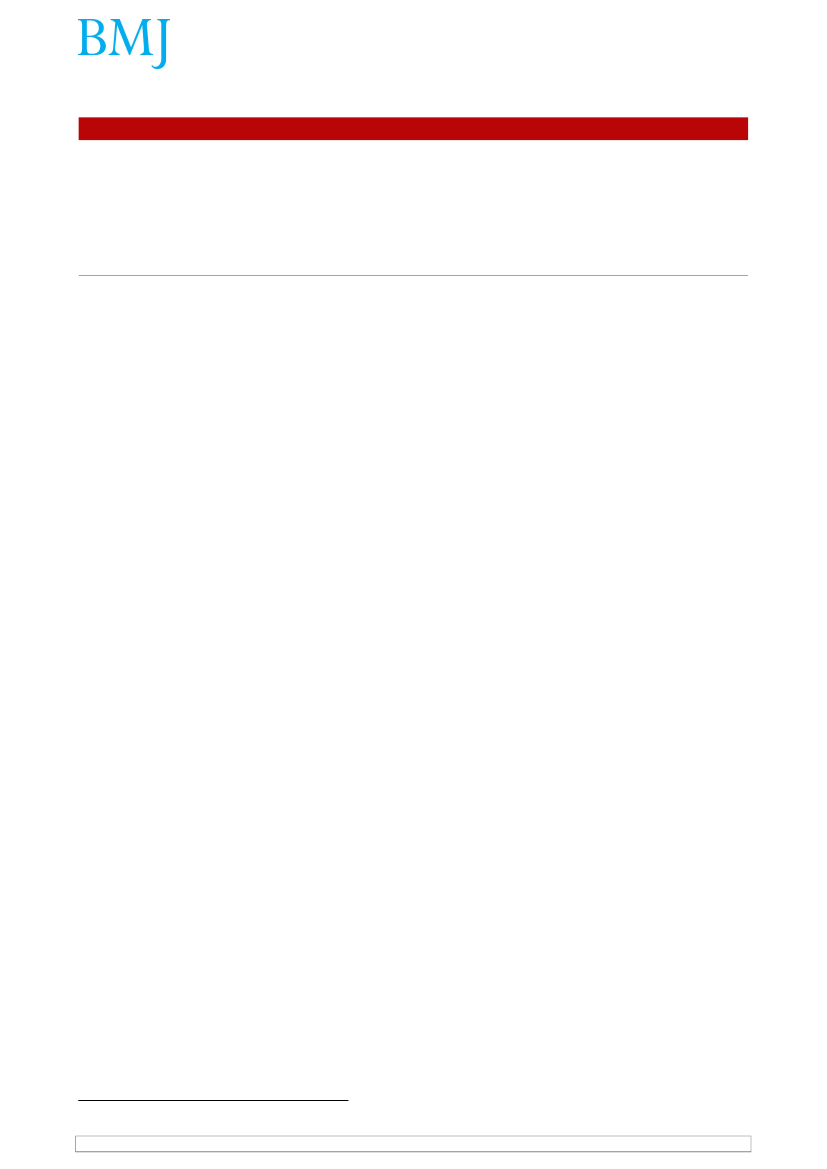Sundheds- og Forebyggelsesudvalget 2012-13
SUU Alm.del Bilag 109
Offentligt
BMJ2012;345:e8462 doi: 10.1136/bmj.e8462 (Published 14 December 2012)Views & Reviews
Page 1 of 2
VIEWS & REVIEWSPERSONAL VIEW
Big pharma often commits corporate crime, and thismust be stoppedPeter C Gøtzscheprofessor, Nordic Cochrane Centre, Rigshospitalet, Blegdamsvej 9, DK-2100Copenhagen, DenmarkWhen a drug company commits a serious crime, the standardresponse from the industry is that there are bad apples in anyenterprise. Sure, but the interesting question is whether drugcompanies routinely break the law.The disconnect between the drug industry’s proclamations—ofthe “highest ethical standards,” of “following . . . all legalrequirements,” and providing “most accurate informationavailable regarding prescription medicines”4 5—and the realityof the conduct of big pharma is vast. These proclamations arenot shared by the companies’ employees or experienced by thepublic. An internal survey of Pfizer employees in 2001 showedthat about 30% didn’t agree with the statement, “Seniormanagement demonstrates honest, ethical behavior.”6When5000 Danes ranked 51 industries in terms of the confidence theyhad in them, the drug industry came second to bottom, beatenonly by automobile repair companies. A US poll also rankedthe drug industry at the bottom, together with oil and tobaccocompanies.The consequences of these crimes are huge, including theunnecessary deaths of thousands of people and many billionsin losses for our national economies every year.7As doctorshave access only to selected and manipulated information, theybelieve drugs are far more effective and safe than they reallyare. Thus, both legal and illegal marketing leads to massiveovertreatment of the population. In the US, the most sold classof drugs in 2009 (in US dollars) was antipsychotics.Antidepressants came fourth, after lipid lowering drugs andproton pump inhibitors. It is hard to imagine that so manyAmericans can be so mentally disturbed that these sales reflectgenuine needs.
I googled the names of the 10 largest drug companies incombination with the term “fraud” and looked for offences onthe first page for each company. The most common recentcrimes were illegal marketing by recommending drugs fornon-approved (off label) uses, misrepresentation of researchresults, hiding data on harms, and Medicaid and Medicare fraud.1All cases were related to the United States and involved hugesettlements or fines, exceeding $1bn (£620.6m; €769m) eachfor four companies.It was easy to find additional crimes committed by these samecompanies and committed outside the US.1As the crimes werewidespread and repetitive, they are probably committeddeliberately—because crime pays. Pfizer, for example, agreedin 2009 to pay $430m to resolve charges related to illegalmarketing of gabapentin (Neurontin), but as sales were $2.7bnin 2003 alone, and as about 90% was for off label use, suchfines are far too small to have any deterrent effect. When Pfizerwas fined $2.3bn for off label use of four other drugs, also in2009, the company entered into a corporate integrity agreementwith the US Department of Health and Human Services to detectand avoid such problems in future. Pfizer had previously enteredinto three such agreements in the past decade.2
Of the top 10 drug companies, in July 2012 only Roche was notbound by such an agreement. However, over 10 years in the1990s, high level executives in Roche had previously led avitamin cartel that, according to the US Justice Department,was the most pervasive and harmful criminal antitrust conspiracyever uncovered.3Roche agreed to pay $500m to settle charges,equivalent to about one year’s revenue from its US vitaminbusiness.Doctors are often complicit in these crimes, as kickbacks andother forms of corruption were common; they were induced touse expensive drugs and paid to lend their names to ghostwrittenarticles purporting to show that a drug works for unapprovedconditions.1
It is time to introduce tougher sanctions, as the number ofcrimes, not the detection rate, seems to be increasing.8Finesneed to be so large that companies risk going bankrupt. Topexecutives should be held personally accountable so that theywould need to think of the risk of imprisonment when theyconsider performing or acquiescing in crimes. To bring thecrimes to light also outside the US, we need laws that protectwhistleblowers and ensure they get a fair proportion of the fines.We also need to avoid the situation that, by settling accusationsof crimes, drug companies can pretend they are innocent, whichthey often do.We also need laws requiring firms to disclose all knowledgeabout their drugs and research data,7and laws that not only allow
[email protected]For personal use only: See rights and reprintshttp://www.bmj.com/permissionsSubscribe:http://www.bmj.com/subscribe
BMJ2012;345:e8462 doi: 10.1136/bmj.e8462 (Published 14 December 2012)
Page 2 of 2
VIEWS & REVIEWS
but require drug agencies to publish what they know, withouthiding under some absurd “proprietary nature of companies’trial results” clause, as happened with rosiglitazone9—with theconsequence that the public was not informed that the drugcauses myocardial infarction.Last but not least, doctors and their organisations shouldrecognise that it is unethical to receive money that has beenearned in part through crimes that have harmed those peoplewhose interests doctors are expected to take care of. Manycrimes would be impossible to carry out if doctors weren’twilling to participate in them.1 10 11 12 13
1234
5678
Competing interests: the author has completed the ICMJE uniformdisclosure form at www.icmje.org/coi_disclosure.pdf (available onrequest from the corresponding author) and declares: no support fromany organisation for the submitted work; no financial relationships withany organisations that might have an interest in the submitted work inthe previous 3 years; no other relationships or activities that could appearto have influenced the submitted work.Provenance and peer review: Not commissioned; externally peerreviewed.A fuller account is at www.cochrane.dk/research/corporatecrime.
910111213
Gøtzsche PC. Corporate crime in the pharmaceutical industry is common, serious andrepetitive. 2013. www.cochrane.dk/research/corporatecrime.Tanne JH. Pfizer pays record fine for off-label promotion of four drugs.BMJ2009;339:b3657.Barboza D. Tearing down the facade of ‘Vitamins Inc.’ 10 Oct 1999.New York Times.www.nytimes.com/1999/10/10/business/tearing-down-the-facade-of-vitamins-inc.html.Kelton E. More drug companies to pay billions for fraud, join the “dishonor roll” after Abbottsettlement. 10 May 2012.Forbes. www.forbes.com/sites/erikakelton/2012/05/10/more-pharma-companies-to-join-the-dishonor-roll-pay-billions-for-fraud-following-abbotts-settlement.Pharmaceutical Research and Manufacturers of America (PhRMA). PhRMA code oninteractions with healthcare professionals—signatory companies. 11 June 2012. www.phrma.org/sites/default/files/108/signatory_companies_phrma_code_061112.pdf.Rost P. The whistleblower: confessions of a healthcare hitman. Soft Skull Press, 2006.Gøtzsche PC. Why we need easy access to all data from all clinical trials and how toaccomplish it.Trials2011;12:249.Almashat S, Preston C, Waterman T, Wolfe S; Public Citizen’s Health Research Group.Rapidly increasing criminal and civil monetary penalties against the pharmaceuticalindustry: 1991 to 2010. 16 December 2010. www.citizen.org/documents/rapidlyincreasingcriminalandcivilpenalties.pdf.Cohen D. Rosiglitazone: what went wrong?BMJ2010;341:c4848.Braithwaite J. Corporate crime in the pharmaceutical industry. Routledge, 1984.Angell M. The truth about the drug companies: How they deceive us and what to do aboutit. Random House, 2005.Kassirer JP. On the take: how medicine’s complicity with big business can endanger yourhealth. Oxford University Press, 2005.Newman M. Bitter pills for drug companies.BMJ2010;341:c5095.
Cite this as:BMJ2012;345:e8462� BMJ Publishing Group Ltd 2012
For personal use only: See rights and reprintshttp://www.bmj.com/permissions
Subscribe:http://www.bmj.com/subscribe


